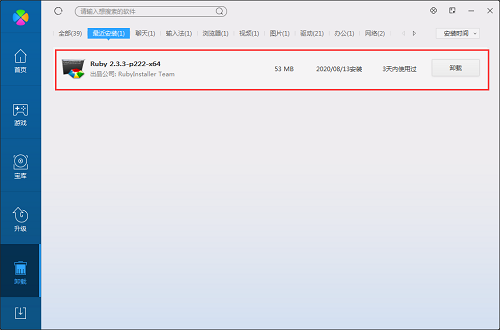

- #Rubyinstaller failed to open tcp to repo. how to
- #Rubyinstaller failed to open tcp to repo. install
- #Rubyinstaller failed to open tcp to repo. 32 bit
- #Rubyinstaller failed to open tcp to repo. Offline
$msys2 exec pacman -sync -clean -noconfirm language: rubyĮxport msys2+='& set MSYS=winsymlinks:nativestrict 'Įxport msys2+='& C:\\tools\\msys64\\msys2_shell.cmd -defterm -no-start'Įxport mingw64="$msys2 -mingw64 -full-path -here -c -" In this case we may use wunderwaffe from travis. There is another variant: use mingw-w64-x86_64-ruby instead of ruby from rubyinstaller and i think it will be much better, it will have less issues with library bindings. Please checkout the following successful log. Using this simple config I’ve added windows testing for small gem ocg.
#Rubyinstaller failed to open tcp to repo. install
ridk.cmd exec pacman -sync -noconfirm -neededĪfter that you can make gem install json with extensions successfully.

, it can be replaced by ridk.cmd exec, because we have to deal with rubyinstaller anyway. Official travis documentation introduced some strange wunderwaffe export msys2 =. PS we don’t need to use complete base-devel mingw-w64-x86_64-toolchain packages, mingw-w64-x86_64-binutils, mingw-w64-x86_64-crt-git, mingw-w64-x86_64-gcc, make will be enough. Thats why users have to bring together ruby build for windows by rubyinstaller (unpacked by choco) and msys2. There are several platform strings that change with the new release.
#Rubyinstaller failed to open tcp to repo. Offline
Media Changes: Easier handling of online vs offline installation. The modern C-runtime brings better compatibility to C standards and to libraries compiled with Microsoft Visual Studio. Important Notice SUSE Linux Enterprise 15 Service Pack 2 (SLE 15 SP2) is a Refresh Service Pack. There is a problem: ruby from msys2 package was not configured properly, this config may be valid for cygwin, but not for mingw. RubyInstaller-3.1.0-圆4 has a changed C-runtime called UCRT replacing the old MSVCRT. powershell -command 'Set-MpPreference -DisableBehaviorMonitoring $true'
#Rubyinstaller failed to open tcp to repo. 32 bit
The 32 bit (x86) version is recommended only. It provides the biggest number of compatible gems and installs the MSYS2 Devkit alongside Ruby, so gems with C-extensions can be compiled immediately. powershell -command 'Set-MpPreference -DisableArchiveScanning $true' If you don’t know what version to install and you’re getting started with Ruby, we recommend that you use the Ruby+Devkit 3.2.X (圆4) installer. powershell -command 'Set-MpPreference -DisableRealtimeMonitoring $true' I think I have fixed that by adding the following to the beginning of the job to turn off Windows Defender. (All the choco work is hidden under powershell -c "fudge install")Įven then, I cant install travis.rb easily, because it depends on pusher-client which depends on json, which needs -lgmp, and … ouch … I gave up and added gem "pusher-client", "~>0.4.0" to my Gemfile because that version doesnt need the json gem.Īlso I found that adding DevKit to the PATH caused everything to run extremely slowly.

I would rather not install either given the problems with using msys. In addition to that as mentioned by Dawood Awan in his comment, opening a TCP connection to the port 443 is usually.
#Rubyinstaller failed to open tcp to repo. how to
If you do not get any IP address, your system dont know how to resolve this and the problem is not related to Ruby. Run this command on your terminal: dig +short. Worker 0 (PID: 22107) booted in 0.Has anyone managed to tweak the pre-installed ruby environment so that can compile gems? Start by checking your network configuration. Vite-plugin-ruby:config outDir: './././public/vite-dev', Vite-plugin-ruby:config assetsDir: 'assets', If you don’t know what version to install and you’re getting started with Ruby, we recommend that you use the Ruby+Devkit 3.2.X (圆4) installer. Vite-plugin-ruby:config sourcemap: false, Vite-plugin-ruby:config emptyOutDir: true, Vite-plugin-ruby:config base: '/vite-dev/',


 0 kommentar(er)
0 kommentar(er)
